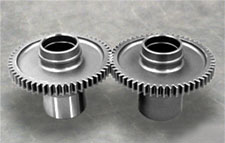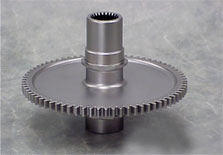
|
|||||||||||||||||||||||||||||||||

Gears Manufacturer
Gears are mainly used for transmission of power and motion. In order that the rotary motion of the driven shaft be perfectly uniform relative to the driving shaft, it is essential that both gears be of perfect geometrical form and be perfectly mounted on perfect factor which decides the accuracy of gearing is the precision with which gears are manufactured. For closer control over the accuracy of manufacture, precision measurement of gears plays a vital role. Fortunately developments in manufacture of gear and its inspection techniques have gone hand-in-hand. For measurement of gears , which is rather complex field it has been possible to follow general rule of metrology, ie., the accuracy of measurement should be better than the component tolerance by a factor of 10. Various types of gears commonly used are Spur Gear : It is a cylindrical gear whose tooth traces are straight lines Helical Gear : It is a cylindrical gear whose tooth traces are straight helices Spiral Gear : A gear whose tooth traces are curved lines Straight Bevel Gear : A gear whose tooth traces are straight line generators of a cone. It is conical in form operating on intersecting axes usually at angles. Worm Gear Pair : The worm and mating worm wheel have their axes non-parallel and non-intersecting. |
|

